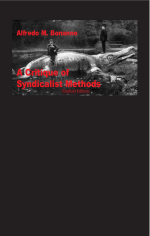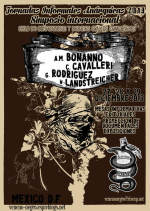Full list of texts
Alfredo M. Bonanno
A Critique of Syndicalist Methods
Halfway through the Seventies the world was still tied to rigid forms of productivity. Castled in its new fortresses, capital defended itself by having recourse to the final returns of the old Taylorism. It tried to rationalise production in every possible way by applying new complicated techniques of control at the workplace, drastically reducing the mechanisms of defence that the working class had cut out for themselves during a century and a half of exploitation on the line.
Feb 20, 2017 Read the whole text...
Juan José Garfia
ADIÓS PRISIÓN
The story of the most spectacular escapes
This book talks about freedom, the urgent need for freedom and the impossibility of living without it. This book says that freedom must be taken back at all costs and that is exactly what the protagonists of Adiós Prisión, Spanish prisoners under the infamous FIES regime, did: they took back their freedom using all means necessary, challenging the impossible, ready to kill for it if necessary. There is no room for political correctness or abstract morals concerning human life here: if the screws keep you locked up and your life, even in its most banal and insignificant aspects, is at the mercy of their caprice, violence and stupidity, your only choice is to eliminate them if they put themselves between you and your freedom.
Feb 18, 2017 Read the whole text...
Alfredo M. Bonanno
After Marx, autonomy
The road ahead of the proletariat is blocked: the reformist parties, trade unions and employers have coalesced to obstruct any growth in the level of the struggle, or any conquests that could lead to a revolutionary transformation of production relations.
Feb 8, 2017 Read the whole text...
Wolfi Landstreicher
Against the Logic of Submission
Submission to domination is enforced not solely, nor even most significantly, through blatant repression, but rather through subtle manipulations worked into the fabric of everyday social relationships. These manipulations — ingrained in the social fabric not because domination is everywhere and nowhere, but because the institutions of domination create rules, laws, mores and customs that enforce such manipulations — create a logic of submission, an often unconscious tendency to justify resignation and subservience in one’s everyday relations in the world.
Jan 26, 2017 Read the whole text...
A glimpse into the elsewhere Recounted by an anarchist who ventured there for a moment in December 2008
From the moment that 14 year old Alexis Grigoropoulos was gunned down by a patrolling policeman on December 6 2008, the morphology of Greece’s capital city and many others, both on the mainland and in many of the islands, changed. The force of the people’s anger against the State and its paid killers expressed itself with limpid clarity: Athens, a European metropolis, had no cop station left untouched, no bank left functioning. Huge stores, banks and public buildings were gutted by fire and hundreds of luxury cars and car showrooms went up in flames, as the streets were blocked off with flaming barricades and hundreds of police in riot gear were forced to run away from the rebels.
Feb 23, 2018 Read the whole text...
Albania, Laboratory of Subversion
After all, isn’t the great desire of each one of us to find ourselves prepared when the next revolt breaks out? What better then than to contribute to making these revolts spread wherever they start up, as well as revealing the premonitory signs of rage and hatred of exploitation in all its forms, concretely, now?
Jan 26, 2017 Read the whole text...
Bernard Thomas
Alexander Marius Jacob
Alias Escande, alias Attila, alias Georges, alias Bonnet, alias Feran, alias Hard to Kill, alias The Burglar
Rigor and precision have finally disappeared from the field of human procrastination. With the recognition that a strictly organisational perspective is not enough to solve the dilemma of ‘what is to be done’, the need for order and security has transferred itself to the field of desire. A last stronghold built in fret and fury, it has established a bridgehead for the final battle. Desire is sacred and inviolable. It is what we hold in our hearts, child of our instincts and mother of our dreams. We can count on it, it will never betray us.
Feb 22, 2017 Read the whole text...
Alma Melgarito
Anarchism and the Law
Introductory talk at the Days of Informal Anarchy, International Symposium, Mexico D.F., 27, 28, 29 December, 2013.
Feb 17, 2018 Read the whole text...
Alfredo M. Bonanno
Anarchism and the National Liberation Struggle
Anarchists have tended to shy away from the problem of the national liberation struggle or rejected it entirely because of their internationalist principles. If internationalism is not to be merely meaningless rhetoric, it must imply solidarity between the proletariat of different countries or nations. This is a concrete term. When there is a revolution, it will be as it has been in the past, in a precise geographical area. How much it remains there will be directly linked to the extent of that internationalism, both in terms of solidarity and of the spreading of the revolution itself.
Feb 6, 2017 Read the whole text...








